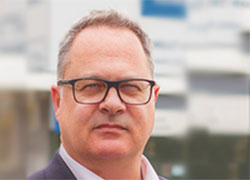Can you Introduce yourself and your role at the Doherty Institute?
I am Dr Martin Elhay and I have been the Business Development Director here since December 2020 following a period seconded to the Doherty for the COVID-19 response in March 2020. I look after all the commercial engagement and business development needs of the Doherty Institute, including assisting with all forms of interaction of government and industry engagement and direct commercialisation efforts of intellectual assets.
How did you end up in this field?
I have a PhD in Immunology from the Walter and Eliza Hall Institute of Medical Research (WEHI) where I worked on a parasitic disease Leishmaniasis. I then worked on ovine immunology, specifically the cytokine response to parasitic infections. During this time, I started working with vaccines and animal models of disease which led to a second post-doc in Copenhagen, Denmark where I worked on tuberculosis vaccines and diagnosis.
On return to Australia I ended up doing some sessional work with the Australian pharmaceutical company AMRAD which introduced me to doing science in industry. This gave me the introduction I needed to a different world of R&D. I ended up spending nearly 15 years in the pharmaceutical industry at CSL then Pfizer. There are actually several veterinary vaccines now available that I brought to market.
One day in 2013 a friend and fellow WEHI Immunoparasitology PhD graduate, said he was leaving a Business Development role at the University and thought I might want to replace him. I figured I had always been on the other side of licence deals – so why not? It might be an opportunity to help the University get impact from its research given I knew how industry liked to be engaged.
What does a typical day at the Doherty Institute look like for you?
Back to back Zoom meetings. Increasingly we are getting back to face to face which is where business development occurs naturally. My work varies from working on new intellectual property disclosures, marketing University of Melbourne assets to investors, dealing with complex issues around intellectual property (IP), developing collaborations and contract research.
Through your role, you help translate the work of researchers in a way that has real life impact. What’s something you’ve worked on that you are really proud of?
I am particularly proud of how we supported the Victorian Infectious Diseases Reference Laboratory at the Doherty Institute to get the SARS-CoV-2 virus out to so many public health laboratories, collaborators, and companies around the world. It was this act of sharing the virus which enabled laboratories around the world to create the antibody tests still being used today to detect COVID-19 in patients. There a couple of major projects I’m supporting now which will have a huge impact if successful.
Why is it so important that scientists and researchers have someone like you on their side?
It can’t be underestimated how important it is to understand to a fairly high level the science conducted at the University. With my industry experience, knowledge and pragmatic approach I see how we can find a path to impact and/or commercialisation. I can act as a translator or go-between because I have worked in both industry and academia. I understand the stresses of research in a resource constrained environment, but I also understand the pressures R&D and licencing teams face in major pharmaceutical companies. I can also be the person that buffers the University from some of the more challenging behaviours of companies and their CEOs. When it comes to research pricing, I can be the Good Cop to the Academic’s Bad Cop!
What is one of the most challenging things researchers face when it comes to commercialising or developing their research?
There are several challenges in my opinion. Doing genuinely original work that is robust and is patentable and meets a need. Balancing the need to publish and protect that work. Finding the time and resources to do the follow up required to take an intellectual asset through realisation. I’m here to help with all of this.
What’s your guilty pleasure?
Really good crème anglaise.
More updates and news from the Doherty Institute
